Good nightpublished at 19:40 BST 11 June 2020
That's all for today's live coverage. We will be back early tomorrow morning with more updates on how the coronavirus pandemic is affecting Scotland. Stay safe.
The Scottish government reveals the latest data about the R-number - on June 5 it was estimated to be between 0.6 and 0.8
In order for more restrictions to be lifted the re-infection rate needs to be as low as possible - and ideally at zero
Nicola Sturgeon says that based on the evidence, there will be no change to the two metre rule
As many as 1,800 jobs could be axed by the Macdonald Hotel chain
The construction industry can move from its preparatory phase. Work on building sites can be carried out and be restored to full capacity "gradually"
Latest figures show there are 628,200 furloughed workers in Scotland
MPs have been questioning Scotland's health secretary on the response to the pandemic
BBC Scotland News
That's all for today's live coverage. We will be back early tomorrow morning with more updates on how the coronavirus pandemic is affecting Scotland. Stay safe.
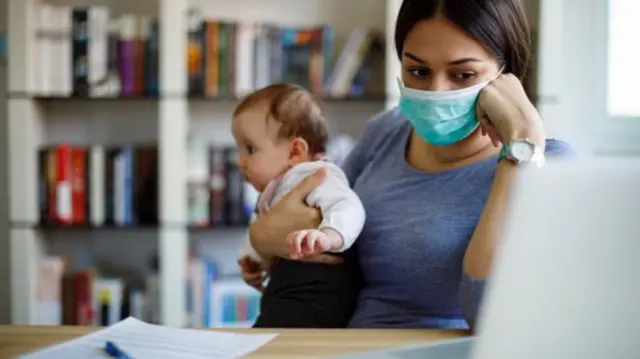 Image source, Getty Images
Image source, Getty ImagesThe Office for National Statistics (ONS) has calculated, external, for the first time, the effect of the coronavirus outbreak on household spending.
It found that a typical household in the UK normally spent an average of £182 a week on activities, such as travel, holidays and meals out, which have been mostly curtailed during the virus outbreak.
Many households have been saving that money or using it to cover any loss of income - but there remains the need for about 53% of income to be spent on essentials, such as food and housing.
For young people a greater proportion of their income goes on essentials than other groups.
With little in savings and less chance to cut spending, the under-30s are likely to be hit the hardest if their income drops.
Allow X content?
This article contains content provided by X. We ask for your permission before anything is loaded, as they may be using cookies and other technologies. You may want to read X’s cookie policy, external and privacy policy, external before accepting. To view this content choose ‘accept and continue’.
Allow X content?
This article contains content provided by X. We ask for your permission before anything is loaded, as they may be using cookies and other technologies. You may want to read X’s cookie policy, external and privacy policy, external before accepting. To view this content choose ‘accept and continue’.
 Drivetime with John Beattie
Drivetime with John Beattie
BBC Radio Scotland
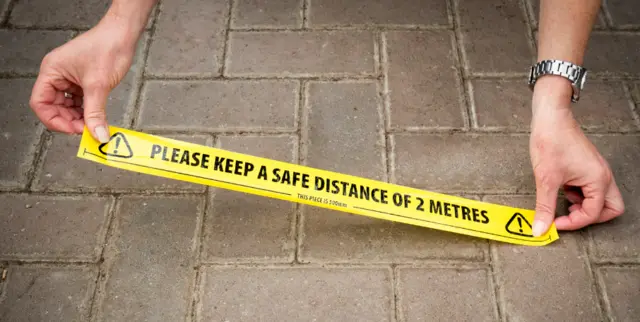 Image source, PA Media
Image source, PA MediaAs well as announcing a small drop in the R number today- essentially the rate at which the virus spreads - the first minister was adamant that the 2m distancing rule remains best for now.
Prof Susan Michie, co-director of the Behavioural Sciences Policy Research Unit for England and Wales, agrees.
"The further away you are, the less risk it is," she states on BBC Radio Scotland.
"If it's less than 2m, there needs to be a very low rate of transmission and there needs to be a lot of other measures. Remember, we still have thousands of people catching this horrible disease every week."
However, Dr Mike Longeran, a senior statistician and epidemiologist at Dundee University, takes another view after compiling various studies, saying the rates of infection are "pretty much the same" for the different recommended distances.
But Dr Christine Tait-Burkard, an expert in infection and immunity at the University of Edinburgh, quickly points out that super-spreaders are a serious problem and the evidence tells us the closer people were to the source, the quicker they were infected.
 Drivetime with John Beattie
Drivetime with John Beattie
BBC Radio Scotland
The number of coronavirus deaths in the UK would have been halved if lockdown had been introduced a week earlier, is what Prof Neil Ferguson, a former government adviser, asserted yesterday.
Do John Beattie's panel of experts agree on this one?
Dr Mike Longeran gives an emphatic yes, adding that the number would have doubled if it had come a week later.
Dr Christine Tait-Burkard says the UK had more time to react than most parts of Europe but didn't respond adequately, although she believes the high death rate is not simply down to not locking down fast enough, saying that the number of care home fatalities is a tragedy that could have been prevented.
And Prof Susan Michie has already put her name to a letter calling for a public inquiry, saying we need more transparency.
"[The UK government] have not published what has informed their decision-making, so that everybody can judge for themselves," she said. "To what extent are things being done for other political reasons? To what extent is it being done for scientific, evidence-based reasons?"
 Drivetime with John Beattie
Drivetime with John Beattie
BBC Radio Scotland
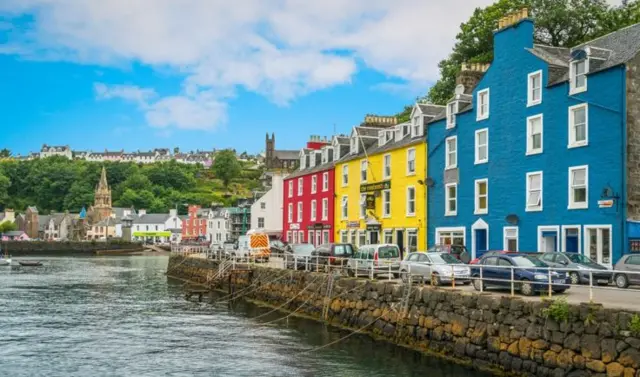 Image source, E55EVU
Image source, E55EVUBusinesses on island communities may not be able to open while the 2m rule is in operation, the chairman of Visit Mull & Iona says.
Colin Morrison says many will be "pretty hopeful" the distance can be reduced by 15 July, when the tourism sector has been given the go-ahead to reopen.
The islands face the "added issue" of ferries, which may only be able to run at 20% capacity he adds.
Elaine Tulloch of Destination Orkney says the provisional date has brought some comfort to the sector and they will be looking to work with transport operators in the coming weeks.
The chief executive says the sector wanted to open in a way that is safe and part of a joined-up approach.
 Kheredine Idessane
Kheredine Idessane
BBC Sport Scotland
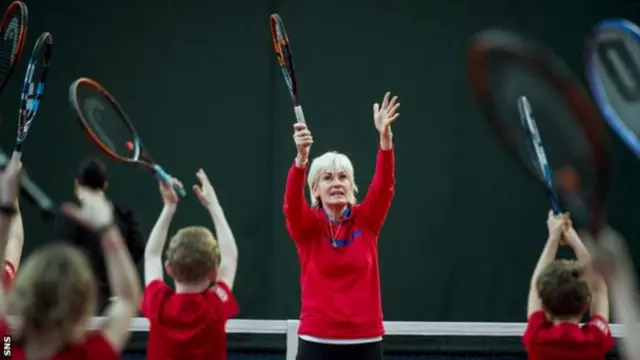 Image source, SNS
Image source, SNSJudy Murray says tennis must seize the opportunity of being one of the first sports back after lockdown and avoid losing players.
Coach Murray, mother of Grand Slam winners Jamie and Andy, has enlisted her sons to produce online exercise modules for players of all ages.
Tennis is allowed to be played as coronavirus measures have been eased.
"It's a huge opportunity because we're one of the first sports back," said Murray.
1. Coronavirus (COVID-) Phase 1: staying at home and away from others (physical distancing), external
This is the guidance for the first phase of easing the lockdown. We are still currently in phase one.
This includes the crucial four phase approach to easing out of lockdown.
If you have Covid-19 symptoms, book a test immediately via NHS Inform online or phone 0800 028 2816.
The latest from NHS Scotland and the Scottish government, including social distancing, face covering and stay at home advice.
5. Coronavirus (COVID-19): shielding support and contacts, external
6. Support for those at high COVID-19 risk, external
Mental health support and advice for these worrying and uncertain times.
Why won't the first minister be drawn on when she will allow pubs to reopen or introduce a social bubble?
Read More Drivetime with John Beattie
Drivetime with John Beattie
BBC Radio Scotland
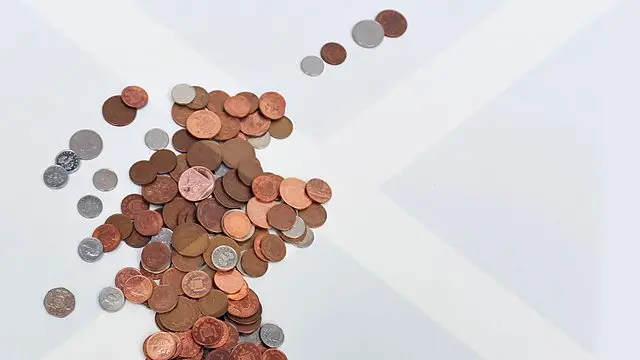 Image source, PA Media
Image source, PA MediaEconomy Secretary Fiona Hyslop insists that until the virus is under control, Scotland cannot have the economic recovery it needs.
It is about balancing risks to public health and risks to the economy, she adds.
We're going to have to live with risk for some time to come until there is a vaccination, the cabinet secretary tells Drivetime.
People must have confidence in safety practices at workplaces, hence the sector-by-sector guidance being considered, she explains.
She emphasises the need to ensure there is no second wave of infection, because that would be "absolutely catastrophic".
Allow X content?
This article contains content provided by X. We ask for your permission before anything is loaded, as they may be using cookies and other technologies. You may want to read X’s cookie policy, external and privacy policy, external before accepting. To view this content choose ‘accept and continue’.
 Drivetime with John Beattie
Drivetime with John Beattie
BBC Radio Scotland
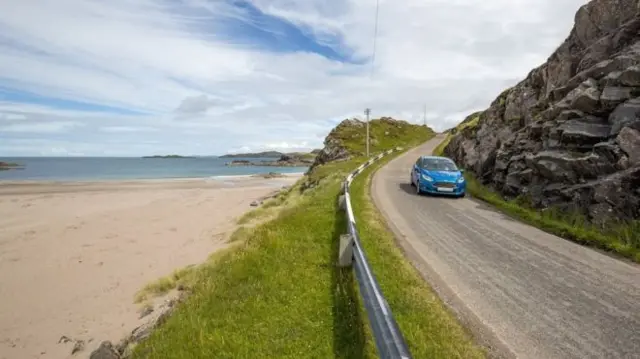 Image source, VisitScotland
Image source, VisitScotlandVouchers worth £100 should be given to families to allow them to holiday in Scotland, the Common Weal think tank has proposed.
Robin McAlpine argues on Drivetime this would help alter the structure of Scottish tourism but encourage more sustainable domestic holidays going forward, rather than using cash to bailout hotels directly.
"We are saying take your family on holiday to save the Scottish economy," he adds.
Mr McAlpine also suggests providing a basic income for artists. He says this security would help the community return to normality sooner and lead to an outpouring of Scottish culture.
Allow X content?
This article contains content provided by X. We ask for your permission before anything is loaded, as they may be using cookies and other technologies. You may want to read X’s cookie policy, external and privacy policy, external before accepting. To view this content choose ‘accept and continue’.
 Drivetime with John Beattie
Drivetime with John Beattie
BBC Radio Scotland
The Common Weal think tank will publish recommendations for economic recovery after the health crisis is over.
Robin McAlpine tells Drivetime a key solution would be to empower the Scottish National Investment Bank to take money from, for example, pension funds to provide finance to business. We need a lending system that support and allow businesses to grow in the right way, he says.
MSPs have passed legislation to set up a Scottish National Investment Bank in January, allowing it to be in operation by the end of the year.
He also calls for the cap on Scottish government borrowing to be raised - he suggests this is necessary to spend what will be needed for recovery.
Coronavirus: Can children catch and pass on coronavirus?
How likely children are to catch and spread coronavirus is a frequent topic when it comes to discussing reopening schools.
The problem is that Covid-19 is a new disease and not something scientists have had long to study - meaning the available data on the subject that's currently available is sparse.
Our health correspondent Laura Foster explains what we do know currently about how children are affected by the virus.
 Drivetime with John Beattie
Drivetime with John Beattie
BBC Radio Scotland
Yesterday, Scotland's tourism businesses, including pubs, hotels and restaurants, were told to prepare to reopen on 15 July.
Following a phone call with the first minister, Stephen Leckie, chief executive of the Crieff Hydro Group, says he is "optimistic" about the prospect of getting back to business by then but warns life will be tough if social distancing regulations remain in place, with some businesses simply unable to operate.
"Assuming it happens, it's not the panacea we need," he told BBC Radio Scotland. "But it is all a step in the right direction and for that we are grateful."
Mr Leckie, who plans to open the restaurants on his premises, said he was waiting to hear more on PPE requirements for the sector, but thinks there will be a focus on face masks and screening.
He also reckons it is unlikely that self catering accommodations or caravan parks will be allowed to open any earlier than 15 July.
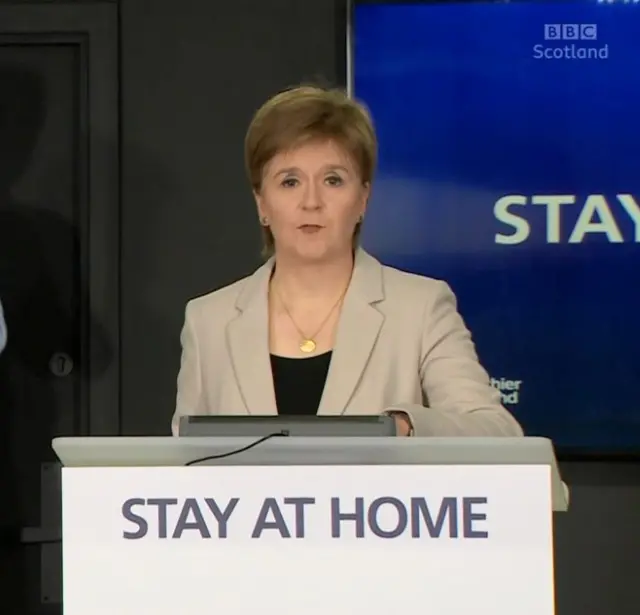
Allow X content?
This article contains content provided by X. We ask for your permission before anything is loaded, as they may be using cookies and other technologies. You may want to read X’s cookie policy, external and privacy policy, external before accepting. To view this content choose ‘accept and continue’.